Talking About the Supreme Court
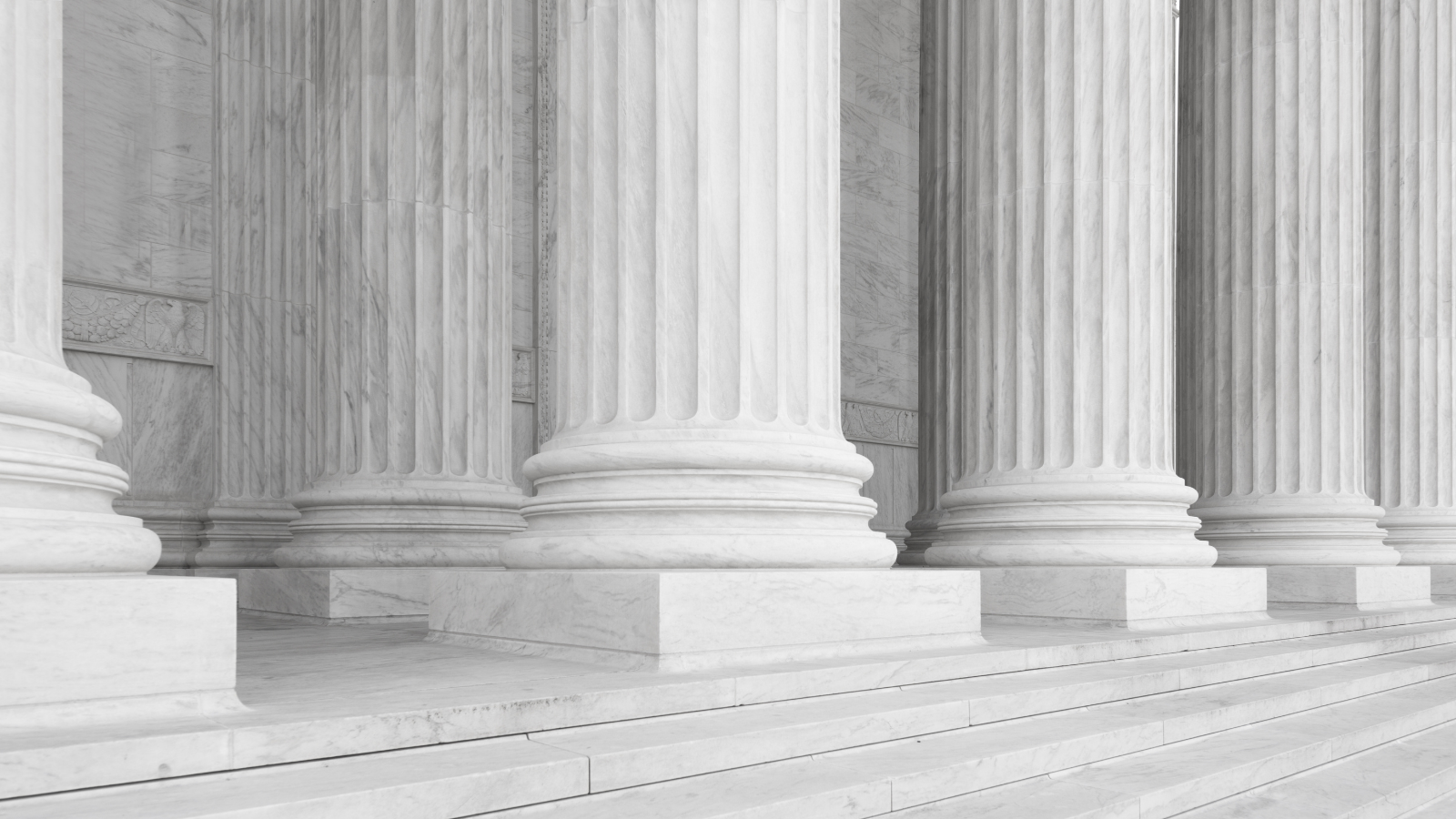
Narrative Principles for Discussing Supreme Court Cases
As the Supreme Court prepares to issue its final decisions of the term, it is vital that we remember the values which underly the essential liberties we strive for. Although our hope is that the Court will ensure that everyone can fully enjoy the protections and rights provided by the Constitution, there are a number of cases pending that could set us back on this aspiration. This includes challenges regarding the extent to which local governments can take steps to prevent organizations from discriminating against LGBTQ couples who want to foster children; whether states can constitutionally restrict voting; and whether the healthcare protections in the Affordable Care Act remain constitutional, among other important cases.
The Opportunity Agenda strongly believes that it is important to uplift the need to protect the hard-fought gains our country has made in promoting and preserving opportunity, while also acknowledging that these hard-fought gains are, in many respects, still incomplete. It is on this premise that we prepare ourselves to critically analyze Supreme Court decisions that might undermine the very progress that has been achieved.
We encourage communicators, advocates, and anyone concerned with social justice to uplift the important point that Supreme Court justices must preserve prior decisions that protect and advance constitutional rights. Below are some suggestions for how to do this, informed by recent opinion research for talking about the Supreme Court as it gets ready to issue these end-of-term decisions.
General Advice
- Focus on what Supreme Court decisions mean to our shared values. Most audiences are not at all familiar with – or even focused on – the outcomes of Supreme Court cases and their impressions will be shaped by headlines and topline rhetoric. It’s important to find ways to engage at that level. A great way to do this is to focus on values, such as reminding people of the kind of country we want to be and drawing on our best ideals. Consider what the decision suggests for the celebration or undermining of those values. Values: Justice, Freedom, Dignity, Fairness, Opportunity, Democracy, Family.
- Don’t focus on what a decision is not. Discuss what it is. Explaining the legal details of what the case does not mean is less powerful than affirmatively stating what it does mean. Spending too much time “myth busting” or telling audiences that the ruling does not outlaw abortion, for instance, only repeats the phrase and strengthens it in audiences’ minds. Remember that “myth busting” doesn’t result in audiences remembering your point – it instead results in the further penetration of the points that opponents make.
- Pivot to solutions and action. While reporters covering the case may want “just the facts,” there are many opportunities to remind audiences of the solutions that the case highlights, and what they can do to make those solutions happen. Progressive and base audiences will be fired up to do something to celebrate or express anger or discontent, so make sure to provide a concrete action. Sympathetic audiences need to be primed to feel as though their efforts matter, and that they can be both despairing of this moment in history, while at the same time remembering that our country’s core principles and history are to slowly make progress even through challenging times. Undecided audiences need to hear the positive alternatives that are possible. Values: Pragmatism, Common Sense, Innovation, Determination to Do the Right Thing, Our Shared Responsibility to Fix Flawed Policies, Solidarity.
Specific Advice for the Pending Decisions
1. LGTBQ Justice and So-Called Religious Freedom
Fulton v. City of Philadelphia
The Supreme Court will be deciding whether the City of Philadelphia improperly terminated its relationship with a Catholic charity that refused to screen same-sex couples as foster parents. The City of Philadelphia refused to work with this charity because of its discriminatory screening practices. Now, the charity is arguing that this termination violated its right to freedom of religion. This case presents a conflict of rights in which the City of Philadelphia is concerned with same-sex couples’ right to be free from discrimination, and the charity is claiming that it has a right to religious freedom in its discriminatory decision not to work with same-sex couples.
Recent public opinion research is helpful in assessing how to respond to this case and the others that are before the Court this term. A recent study polled a nationally representative sample of 2,158 American adults about their views on upcoming Supreme Court decisions[1] The SCOTUS Study asked respondents whether they believed that requiring foster agencies to place children with same-sex couples violated the foster agencies’ right to religious freedom, and 52.2% of the public stated that it does violate these agencies’ right to religious freedom.
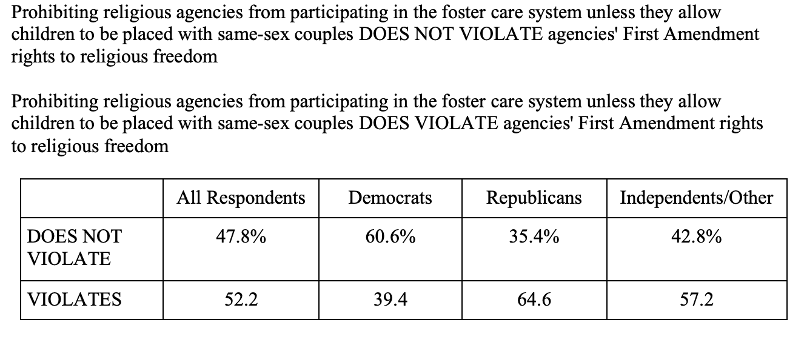
Table 1[2]
This finding suggests communicators and advocates should emphasize the government’s role in preventing discrimination and in ensuring that everyone is able to build a family with dignity. Emphasizing the government’s role in preventing discrimination and the importance of protecting everyone’s right to family and equal justice – including the rights of potential LGBTQ foster couples and their prospective foster children – will be critical. Moreover, communicators and social justice leaders should connect the outcome in the case to our shared values by describing how the outcome in this case might undermine or bolster local governments’ abilities to prevent discrimination.
Values to Uplift When Discussing This Case: Family, Equal Justice, Human Rights, Community, Empathy.
2. Affordable Care Act
California v. Texas
Following its 2012 decision upholding the Affordable Care Act, the Supreme Court will again be deciding upon a challenge to its constitutionality. The Court will decide on two main issues: (1) whether the individual mandate is constitutional; and (2) if the individual mandate is unconstitutional, whether it is nevertheless severable from the Affordable Care Act, allowing this Act to remain in force even if the individual mandate provision is no longer part of it. While it is possible that the Court will not decide upon the substance of the case and will instead find the parties who brought the case to not have standing, it is important to plan for the decision, nonetheless.
The SCOTUS Study found that 55.8% of respondents believed that the individual mandate is unconstitutional. This finding suggests that there is additional work needed to explain how the mandate broadens access to healthcare and is critical to a better-functioning healthcare system.
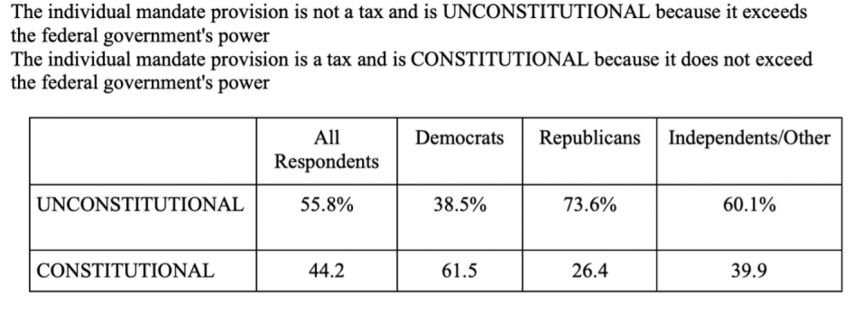
Table 2[3]
Nevertheless, most respondents (53.3%) stated that even if the individual mandate is unconstitutional, it should not affect the rest of the law.
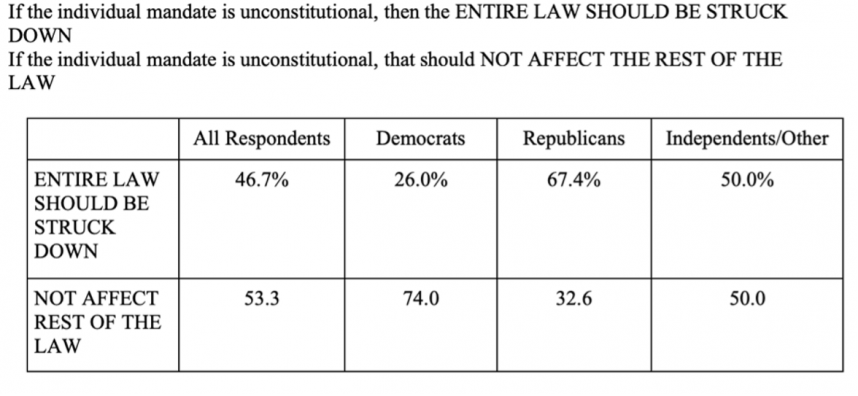
Table 3[4]
If the Court strikes down the mandate and thereby strikes down Obamacare, it will be important to emphasize how the Supreme Court’s choice was excessive and that millions of Americans will be left uninsured by it.
Remind audiences of our responsibilities to our fellow human beings. Access to healthcare is incredibly important and should be uplifted as a value, and after enduring the COVID-19 pandemic, audiences may be more open to these messages than ever before. As we are starting to see glimmers of hope regarding the progression of the COVID-19 pandemic, it remains important to protect everyone’s access to healthcare.
Values to Uplift When Discussing This Case: Human Rights, Community, Health, Empathy, Compassion, Looking Out for One Another.
3. Voting Rights
Brnovich v. Democratic National Committee I
Following Donald Trump’s false claims about the 2020 election, his followers have initiated a massive effort to both continue the drumbeat promoting fraud and suppress voter turnout in many states. For example, Arizona passed a law that (1) prohibits people from getting assistance from others to drop off their ballots on their behalf, and (2) requires that provisional ballots be automatically discarded when a voter votes in the wrong precinct. According to the SCOTUS Study, voters are evenly split on how the Court should resolve these two issues.

Table 4[5]
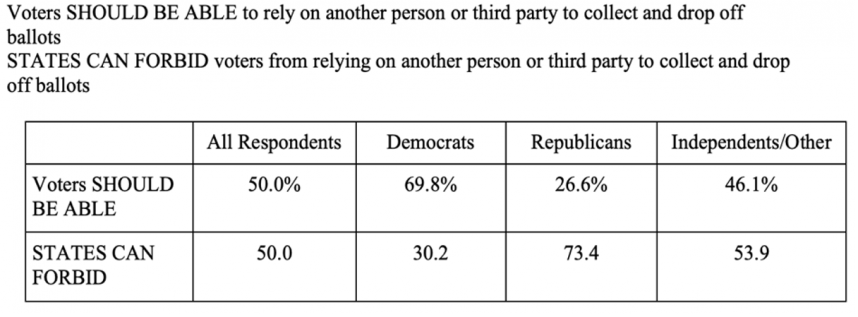
Table 5[6]
The widespread, “big lies” about the 2020 election present unprecedented challenges to our democracy and warrant bold action. The response to the Supreme Court’s decision in this case should emphasize the Court’s role in ensuring that every citizen is able to exercise their right to vote. The Court’s decision may include a ruling about the appropriate standard for challenging voter suppression efforts, which may or may not make it more difficult to contest these threats to our democracy.
Values to Uplift When Discussing This Case: Democracy, Equal Justice, Human Rights, Community, Fairness.
4. Criminal Justice
Terry v. United States
Taharick Terry was convicted for possessing just 4 grams of crack cocaine, the equivalent weight of around four paper clips. He was sentenced to more than 15 years in prison because of a law that produced a 100:1 sentencing disparity for crack cocaine as compared to powder cocaine. This disparity contributed to gross racial inequities in sentencing by targeting the form of cocaine – crack cocaine – that is more prevalent in Black and brown, and lower-income, communities for grossly higher sentences than its powder form.
In 2010, President Obama and Congress reduced the disparity to 18:1 in the Fair Sentencing Act. In 2018, Congress passed the First Step Act, which allowed sentencing reforms to apply retroactively to people already sentenced in prison because of draconian sentencing laws. This case addresses whether offenses like Terry’s fit within the provisions that allow for less serious offenses to be re-sentenced. The decision in this case could have a broad impact on efforts to address some of the harms of excessive and racially biased sentencing laws.
Values to Uplift When Discussing This Case: Equal Justice, Fairness, Human Rights, Community, Family, Due Process.
Conclusion
As a general matter, it is important to communicate carefully, as the first read of any decision can sometimes mislead communicators into saying something they come to later regret, or to say something that isn’t quite the message that is important to uplift. It is therefore especially important to carefully review the Court’s holding(s) in each case and consult those who are working directly on interpreting and commenting about them. Sometimes it may be beneficial to narrowly construct any comments on a decision when formulating your response. Don’t comment until you’ve seen the facts and the lead party’s statement, as well as consulted with those most closely connected to the story that social justice leaders are recommending. Remember, the first statement you make will be the most powerful. Regardless of the outcome, it is beneficial to emphasize how values represent our vision for the aspirations we have for our country, and the importance of what the Supreme Court means to those values.
[1] Stephen Jessee, Neil Malhotra, & Maya Sen, “What Do The American People Think About the 2021 Supreme Court Cases? Results from SCOTUSPoll, a collaboration between researchers at the Harvard Kennedy School of Government, the Stanford Graduate School of Business, and the University of Texas” (April 22, 2021), https://projects.iq.harvard.edu/files/scotus-poll/files/scotuspoll-summary2021.pdf.
[2] Id. at 3.
[3] Id. at 4.
[4] Id. at 5.
[5] Id. at 6.
[6] Id. at 7.


